Chinese Medicines Help Cancer Patients to Endure Surgery
Surgery remains as one of the primary forms of cancer treatment. Nearly all cancer patients will have some kind of surgery, whether it is used to perform a biopsy to confirm the diagnosis, provide local treatment, or obtain other information to help determine whether additional treatment is necessary. However, a lengthy healing process is always needed because of the invasiveness of the procedure. Appropriate preparations before and after surgery is the best way to help the process go smoothly. From a TCM perspective, surgery will unavoidably lead to damage by further exhausting blood and qi, and causing internal disharmony as well. TCM tonifying methods help to buildup the body constitution so as to reduce the risks associated with surgery.
Preparation before surgery
Generally, TCM tonifying methods have to start one or two weeks prior to surgery; they aim at improving general physical strength as well as the specific cancer condition so as to help surgeons to cut away the cancerous tissues as much as possible. Patients are usually treated with the classic prescriptions, which are well known for replenishing blood and qi, and nourishing the liver and kidneys. Classic prescriptions include:
After surgery, when the patients are allowed to eat, physicians usually focus on various other symptoms and helping the patients to prepare for further radio or chemotherapy.
Management after surgery
 |
Regulating spleen and stomach |
Due to anesthesia, bleeding and surgical trauma, the patients' spleen and stomach are always affected. It is common to see symptoms like poor appetite, abdominal distention, constipation, nausea and vomiting. If symptoms are mild, a prescription such as Costus and Amomum with Six Noble Ingredients Decoction (xiang sha liu jun zi tang) is used. If individuals have obvious abdominal distention, constipation, mouth dryness and thick yellow tongue coating, that means there exists qi stagnation and heat accumulated inside the organs. The prescription should also add:
zhi qiao |
Bitter orange peel |
Fructus Aurantii |
hou po |
Magnolia bark |
Cortex Magnoliae Officinalis |
mu xiang |
Costus root |
Radix Aucklandiae |
da huang |
Chinese rhubarb |
Radix et Rhizoma Rhei |
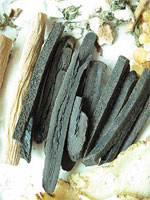 |
|
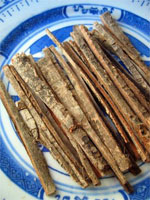 |
|
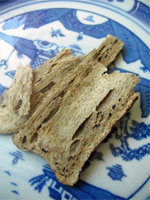 |
| Bitter orange peel |
|
Magnolia bark |
|
Costus root |
In case general weakness is significant, then certain tonifying herbs are added, such as:
 |
Replenishing qi and consolidating body surface |
For some surgical patients, even simple physical activity (or none at all) can easily induce sweating. TCM considers this a morbid condition due to an exterior deficiency (biao xu) or heart deficiency, which makes the individuals susceptible to infections or sleeping problems. A prescription called Jade Windscreen Powder (yu ping feng san) can be employed, some other commonly used herbal ingredients are:
huang qi |
Astragalus |
Radix Astragali |
bai shao |
White peony root |
Radix Paeoniae Alba |
fang feng |
Ledebouriella root |
Radix Ledebouriellae |
fu xiao mai |
Shriveled wheat |
Fructus Tritici Levis |
tai zhi shen |
Heterophylly Falsestarwort root |
Radix Pseudostellariae |
wu wai zi |
Schisandra |
Fructus Schisandrae |
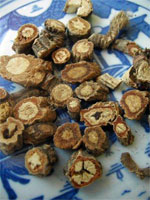 |
|
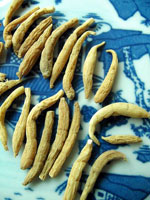 |
|
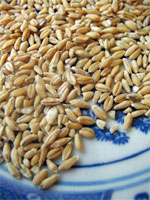 |
| Ledebouriella root |
|
Heterophylly Falsestarwort root |
|
Shriveled wheat |
 |
Nourishing yin to promote body fluid production and reconstruction |
When patients suffer from severe mouth dryness, deep red tongue without any coating, dry stool, no appetite or nausea, in TCM, they are suffering from body fluid exhaustion and damage to stomach yin. A higher dose of herbs are prescribed such as:
nan sha shen |
Fourleaf ladybell root |
Radix Adenophorae Strictae |
bei sha shen |
Coastal Glehnia root |
Radix Glehniae |
mai dong |
Dwarf lily-turf |
Radix Ophiopogonis |
tian hua fen |
Snakegourd root |
Radix Trichosanthis |
yu zhu |
Fragrant Solomonseal rhizome |
Rhizoma Polygonati Odorati |
sheng di |
Rhemannia rhizome |
Rhizoma Rehmanniae |
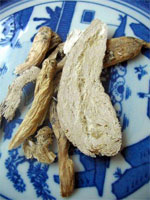 |
|
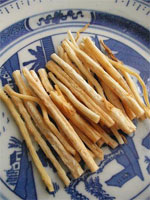 |
|
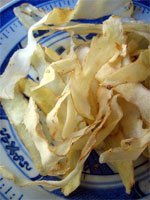 |
| Fourleaf ladybell root |
|
Coastal Glehnia root |
|
Fragrant Solomonseal rhizome |
Long-term rehabilitation with Chinese medicines
Thereafter, for long-term rehabilitation, TCM tonifying methods should be used with some expelling methods like anti-cancer herbs as mentioned previously. For example, lung cancer associated with yin deficiency should mainly enrich the yin and moisten the lungs; however, when it is associated with phlegm and dampness retention, it should also disperse phlegm to soften lumps. In general, tonifying methods like enhancing the spleen and harmonizing the stomach are used for digestive tumors; soothing the liver and regulate the qi is used in breast cancers. These methods help to prevent the recurrence of cancer at a later date. |